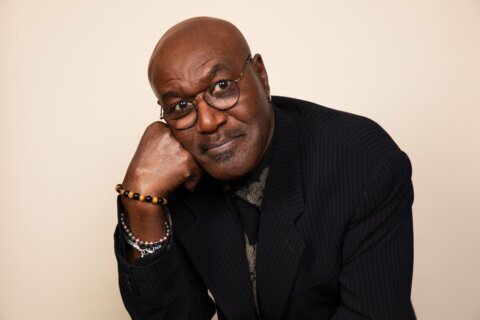
He founded the clothing empire FUBU before becoming an investor on TV’s “Shark Tank.”
Now, Daymond John is out with the new book “Power Shift” (2020), his latest self-help guide to entrepreneurship after “Power of Broke” (2016) and “Rise and Grind” (2018).
“The first book was how you don’t need money to make money, and the second book was how do you maximize 24 hours in a day,” John told WTOP. “The third book is the most basic thing that we do every single day — we negotiate, whether we’re trying to get into the bathroom before our husband or wife, trying to get a raise, or trying to get funding.”
Why did he decide to choose this particular topic?
“I realized a lot of people didn’t understand the power of negotiating,” John said. “The only thing that separates the ones who are successful and the ones who are not is what you’ve negotiated in life. Negotiation is not just when you stand up on the ‘Shark Tank’ platform.”
His approach is best understood as a three-step process.
“Negotiation has three parts to it: building influence; then negotiating what’s in the best interest of the person you’re negotiating with; and then how do you value that relationship and make many more deals after that,” John said.
The book highlights examples from celebrities of sports, business and entertainment.
“I didn’t just put my history in there,” John said. “I wanted to ask Kris Jenner why she was successful, [as well as] Lindsey Vonn, Billie Jean King, Pitbull, Mark Cuban and Bethenny Frankel. I got all of their secrets and tricks of the trade and I put it in there.”
He also spoke to regular folks about their tips for everyday power shifts.
“A young woman named Crystal worked for a university and went on maternity leave,” John said. “She comes back from maternity leave and says, ‘I had a premature baby and I’ve studied how to work virtually for you. Can I work 20 hours at home and 20 hours here at the university?’ They said, ‘We love you, but unfortunately, that’s not the policy.'”
So, she pivoted to create a remote opportunity as a high-paid executive assistant.
“She connected with a virtual assistant company named BELAY and now she works 20 hours for me,” John said. “She lives in Ohio. I live in New York. She also works 10 hours for somebody else, then another five hours for another C.E.O.”
What started as a risky career change became a dream job with endless benefits.
“She doesn’t have to sit in traffic. She doesn’t have to ever go to work. She doesn’t have to wear a mask. She stays home with her baby to raise her child. She makes more money than in her entire life. She works only for people she likes, and she sets her own hours.”
Such stories are where he sees some crossover with the coronavirus quarantine.
“That is why this book is important for people today, because we’re all stuck at home,” John said. “How can we use that time that we’re at home to create a new business and stop having to worry about other people, and be in charge of our own destiny?”
He said you shouldn’t shy away from launching a home business during the pandemic.
“People think, ‘Now is a hard time, should I launch a company now?’ Of course you should launch a company now!” John said. “In 2008, during the last recession, you know what got launched? Uber, Airbnb, Slack, Pinterest, WhatsApp, Square, Venmo. There’s no excuse.”
In fact, his very own success story was launching a clothing company from his mother’s home in Queens in 1992. He called it FUBU, a black-power acronym: “For Us, By Us.”
“I saw a need in the market. I felt that people weren’t valuing the hip-hop market,” John said. “I was working at Red Lobster making decent money at that time as a kid, but I decided to start a business from home. I didn’t have the internet, I didn’t have Instagram and all these things to reach people. I just ran out on the corner and started selling hats.”
After an assist by LL Cool J wearing his merchandise in rap videos, the FUBU business caught fire, growing to the point of $6 billion in global sales over the course of 20 years.
In 2009, he became a household name when Mark Burnett asked him to join “Shark Tank.”
“I was like this thing is stupid, it’s never going to work,” John said. “You would only know Mark Cuban, but who wants to see five other business people that nobody knows talk about stuff we do every single day?’ But you leave it up to a visionary like Mark Burnett.”
He said die-hard fans kept the show on the air in those early years.
“We were going to be canceled the first three years, but it was because of our amazing fans that wrote in saying, ‘We want smart TV,'” John said. “That’s why ‘Shark Tank’ is on the air. Our fan base is one of the most rabid fan bases in TV history. They’re so crazy that they got ABC to move ‘Shark Tank’ from Sunday night back to Friday night at 8 p.m.”
Which success story from “Shark Tank” makes him the most proud?
“I’m so proud of them that I put them in my book: a company called ‘Bombas Socks,'” John said. “They’re the No. 1 brand in ‘Shark Tank’ history and it’s socks! It’s not anything complicated; it’s socks. Every sock they sell, they give a pair away to the homeless.”
We wrapped by getting his rapid-fire thoughts on his fellow “Shark Tank” judges:
Mark Cuban:
“Cowboy.”
Kevin O’Leary:
“Greedy.”
Barbara Corcoran:
“Nuts.”
Robert Herjavec:
“Goofy.”
Lori Greiner:
“Uptight.”
Daymond John (himself):
“Cool. Very cool.”








